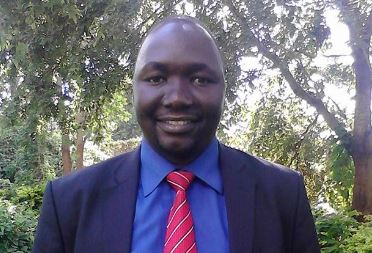The Government of South Sudan has brought serious charges against Former Juba City Council (JCC) Mayor Kalisto Ladu, including several capital offenses that attract the death sentence, Radio Tamazuj has learned.
The outspoken politician who was a crusader against the endemic and often violent land grabbing in and around Juba, was roughed up and picked by National Security operatives from his home on 30 March while his wife and family members spectated. He has since been in detention where he is held incommunicado and has been severely tortured, according to his lawyer.
According to Advocate Wani Santino Jada, the managing partner at M/S Pan African Law Chambers, LLP, and the lawyer representing Ladu, the Government of South Sudan has preferred five charges including conspiracy, subverting a constitutional government, and supplying weaponry to insurgents, bandits and saboteurs for terrorism.
The other charges are possession of dangerous weapons and publishing or communicating false statements prejudicial to South Sudan.
Advocate Wani however contends that these offences must be proven beyond reasonable doubt because to become a crime, the three elements of preparation, execution, and completion must be available in all the crimes or else there is no crime committed by the suspect.
“This is the law in all Common Law jurisdictions. In conspiracy, the coordination among the conspirators must be proven, as well in case of supplying weapons,” he charged. “Who are these insurgents or bandits? Was the suspect found in possession of a weapon when arrested? In the law of crimes, it is easy to copy a section, but it is difficult to prove without completion of the offense.”
Adv. Wani added: “Kalisto is being targeted because he talked about land grabbing in Juba and some parts of South Sudan and his arrest was meant to silence him.”
He said that in Paragraph 16 of the government’s defense filed at the East African Court of Justice on 24 May 2024, there was an averment (allegation) that there was an arrest warrant.
“The question is who issued the warrant and on what date? Who opened the case, in which police station, and which judge or prosecutor issued the [arrest] warrant? And why is it that the copy of the arrest warrant was not attached by way of an affidavit in the defense filed on 24 May 2024 before the court? This arrest warrant was based on forgeries,” Wani stated “Section 54 (2) (3) of the Criminal Procedure Act of South Sudan 2008 requires any person arrested by the National Security to be brought before a magistrate as soon as is reasonably practicable within 24 hours. Section 54 (3) says Once an arrested person is produced before a magistrate or judge the process shall proceed as provided for arrests with warrants under section 55 below.”
According to the lawyer, the Criminal Procedure Act stipulates that every warrant of arrest issued under the provisions of the Act by a Public Prosecution Attorney, Magistrate, or Court shall be in writing, signed or sealed by the Public Prosecution Attorney, Magistrate or Court. The person executing a warrant of arrest shall notify the person to be arrested of the substance thereof and shall show the warrant to him or her, both of which did not happen in the former mayor’s case.
“The subject (Ladu) was arrested at night by National Security without an arrest warrant as required by this law and Section 54 (2)(3) of the South Sudan National Security Act 2014 which requires any person arrested by the National Security to be brought before a magistrate as soon as is reasonably practicable within 24 hours and this has not happened to date,” Adv. Wani enlightened. “Section 83 of the same Criminal Procedure states that a person arrested to be brought before the Public Prosecution Attorney, Magistrate or Court without delay. The person executing a warrant of arrest shall, subject to the provisions of section 79 of the Act, as to security, without unnecessary delay, bring the person arrested before the Public Prosecution Attorney, Magistrate or Court specified in the warrant, and, in any event, within 24 hours after his or her arrest.”
The lawyer said that the government, in their defense, stated that investigations are still ongoing and questioned why the National Security arrested his client when they did not have sufficient evidence and or an arrest warrant.
“You cannot arrest someone and start investigating and looking for evidence yet you ought to start compiling the evidence before the arrest. You cannot arrest someone without evidence and subject him to torture while looking for evidence. This shows that the evidence gathered after the arrest is illegally obtained by the National Security under duress,” Wani stated. “We have credible information that Kalisto was badly tortured and the National Security fears to release him because his body is full of scars as a result of torture, this will portray the National Security in a bad light and they are waiting for the scars to heal before producing him in Court.”




